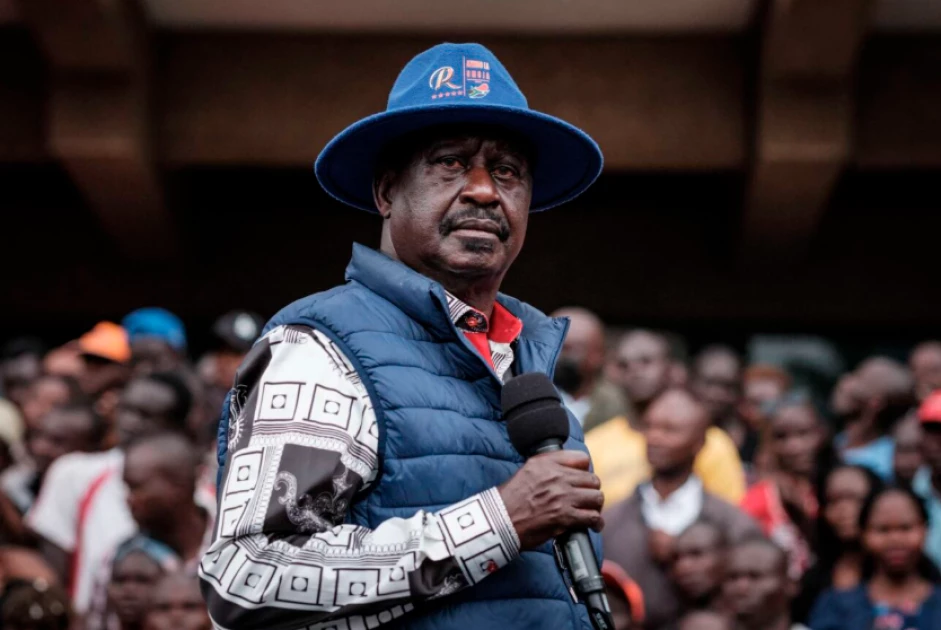OPINION: How Gov't can honour Raila Odinga’s vision for a prosperous Kenya

The late former Prime Minister Raila Odinga during a past campaign rally. PHOTO | AFP

Audio By Vocalize
By Dr. David Ouma
One
of the most memorable moments in my interactions with the late former Prime
Minister, Rt. Hon. Raila Odinga, was on June 14, 2017, during the launch of his
book ‘The Quest for Nationhood.’
The
event came in the run-up to the 2017 General Election, where Raila outlined a
bold roadmap to Kenya’s future, how the nation could reclaim lost ground and
build shared prosperity for all.
I
remember that day vividly. That morning, I received a call from his
Communications Aide, Dennis Onyango, who asked how fast I could read a book. He
instructed me to collect a copy of ‘The Quest for Nationhood’ from Raila’s
Capitol Hill office and read a chapter that I would later present during the
evening launch.
I
was both anxious and honored. That moment remains etched in my memory, and I
remain grateful to Dennis Onyango for the opportunity.
Raila
was then vying for the presidency under the NASA coalition. After the launch, I
had a brief conversation with him and assured him that my generation was
rooting for him because, for us, the stakes were high.
I
have recently revisited the book, and the third chapter titled ‘Economic
Development: Two Different Journeys’ has struck me. In it, Raila examines
Kenya’s economic trajectory and reflects on why we fell behind the Asian
Tigers, nations such as Singapore, South Korea, and Taiwan, with whom we once
shared comparable development indicators. His analysis remains as relevant
today as it was then.
Raila
argues that Kenya’s fixation on import-substitution, an economic strategy that
seeks to replace imports with domestically produced goods, hindered our growth.
While the approach may have been well-intentioned in the early
post-independence years, it soon became counterproductive.
Import-substitution
shelters local industries from competition, making them inefficient and
uncompetitive globally. It discourages innovation, limits access to foreign
exchange, and fosters dependence on state protection and subsidies. The result
is an economy that consumes more than it produces, with limited capacity to
compete beyond its borders.
The
Asian Tigers, on the other hand, pursued export-led industrialization, a
strategy that prioritised production for global markets. They invested in
industrialisation, technology, and education, creating globally competitive
industries that lifted millions out of poverty within a generation.
To
truly honour Raila’s legacy, the government must translate his economic vision
as captured in his book ‘The Quest to Nationhood’ into action. Kenya must pivot
from consumption-driven economy to one that produces and competes globally.
That begins by reimagining our industrial base, not as a protectionist
enterprise, but as a globally competitive force.
This
means investing in value addition for agricultural and mineral products,
expanding manufacturing zones linked to global supply chains, and providing
export incentives to industries that innovate and meet global standards. It
also means strengthening trade diplomacy to open Kenyan goods in Africa, Asia,
and beyond.
Moreover,
the government should prioritize research, technology, and innovation, the
critical foundations of infrastructure. As we model our education system at the
primary and secondary level, can we remodel our tertiary institutions as
research hubs? A vibrant export sector cannot thrive without efficient
logistics, energy stability and skilled human capital.
“In 1970,
the workforce of all the Asian Tigers except Thailand was at least twice as
educated as ours,” Raila notes in the book. This means that the Asian Tigers
did not achieve economic transformation serendipitously; they did so through
long-term investments in education, science, and industrial policy coherence.
Kenya’s
youth, the demographic Raila often referred to as the nation’s greatest
resource, must also be part of this transformation. Empowering young
entrepreneurs with access to credit, export training, and mentorship can
unleash innovation and drive job creation. The Rt Hon Raila Odinga consistently
championed the idea that Kenya’s future lay in its people, their creativity,
their resilience, and their belief in the possibility of a better tomorrow.
In
the end, honouring Raila Odinga’s vision is not about naming roads or buildings
after him or conferring him honours posthumously. It is about completing the
unfinished business of his dream to build a nation that stands tall in the
global economy, not as a passive consumer, but as a confident producer.
If
Kenya can embrace that export-oriented, innovation-driven path, it will not
only uplift millions from poverty but also fulfil the ideals that Raila spent a
lifetime fighting to achieve: equity, productivity, and shared prosperity.
That
would be the most fitting tribute to one of Africa’s greatest sons, a man who,
through his words and deeds, fought for a democratic, prosperous, egalitarian and
enduring Kenya.
[The
author served in Raila’s Communication Strategy team in the 2017 and 2022
Presidential Election Campaigns. davidjesse34@gmail.com
]


Leave a Comment